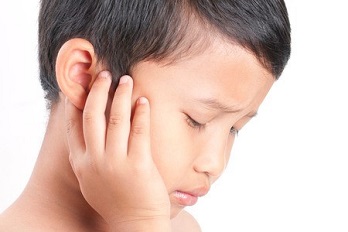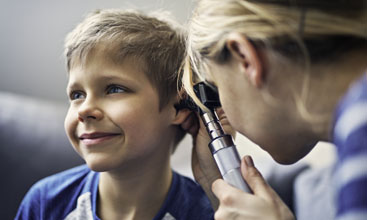Glue Ear
Glue ear is a common condition among young children - particularly affecting the under fives. It’s caused by a build-up of mucus in the middle ear, and can lead to temporary hearing loss.
Luckily in most cases glue ear clears up by itself - within around three months - but if it is untreated for a long time, it can affect your child’s speech and learning, and in rare instances it can lead to permanent hearing loss, so it’s important that it’s carefully monitored.
What causes glue ear?
The space behind the middle air is usually filled with air, but sometimes thick fluid can build up there. This is because the Eustachian tube, running from the nose to the ear, may have become infected and clogged, typically from an ear infection or a severe allergy.
This tube is crucial in maintaining a healthy space in the middle ear - free of excess fluids, which in turn enables our hearing to function normally. The Eustachian tube is narrower in children, making them more prone to developing glue ear.
What are the symptoms of glue ear?
The most common symptom of glue ear is temporary hearing loss. The presence of fluid (rather than air) makes it hard for sound to pass into the inner ear. Sounds and conversation can appear quieter to your child or as if they’re taking place under water.
Other symptoms of glue ear include:
- a feeling of ‘fullness’ inside the ear
- popping in the ear
- mild earache
- tinnitus
- balance problems
How does hearing loss caused by glue ear affect children?
In children, the hearing loss associated with glue ear can, understandably, lead to frustration, especially if they are too young to express themselves. They might start playing by themselves or display challenging or stubborn behaviour.
Hearing loss can easily be missed in very young children and babies, so it’s useful to watch out for the following signs:
- Not responding when you interact with them
- Speaking loudly
- Asking people to repeat what they say
- Turning the TV up too loudly
- Finding it hard to concentrate
- Rudeness, behaviour issues
- Playing alone
If glue ear and hearing loss continue, they can affect a child’s speech development and learning at nursery or school, so it is always good to consult a doctor if you notice any of these signs.
What should I do if my child has glue ear?
If you’re at all worried about glue ear, it’s essential to get your child examined by your GP or an ENT specialist. They will be able to keep an eye on the condition, and prescribe antibiotics if the glue ear is a result of an ear infection.
If the condition doesn’t clear up, your child may be referred for a hearing test or to a paediatric ENT specialist.
What if my child’s glue ear won’t go away?
The paediatric ENT specialists at our clinic are highly skilled at managing and treating glue ear. They can carefully monitor your child for up to a year, and wait for symptoms to improve by themselves.
A simple non-invasive treatment called autoinflation may be used in the meantime for children over three years old, to help fluid in the ear to drain. Antibiotics may also be prescribed for any ongoing infections.
When might a child have grommets for glue ear?
In some cases, where the glue ear has not resolved itself, or keeps recurring, routine surgery is carried out to insert tiny tubes into the ear, known as grommets. These drain away the fluid and keep the eardrums clear, and fall out naturally after 6-12 months, as your child’s ear gets better.
It’s helpful to know that this is a straightforward procedure and can be a highly effective way to prevent further issues.
Visiting our clinic
If you are concerned about your child’s hearing or think they may have glue ear, our specialist team can help. We see babies and children from the age of six months for hearing tests and hearing assessments and have a team of ENT consultants who are experts in monitoring and treating the condition.
To make an appointment please call (020) 7244 4200 or make an appointment online.













